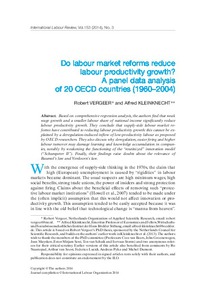Do labour market reforms reduce labour productivity growth? A panel data analysis of 20 OECD countries (1960–2004)

Vergeer, Robert ; Kleinknecht, Alfred
2014
153
3
September
365-393
labour productivity ; low income
Income distribution
http://dx.doi.org/10.1111/j.1564-913X.2014.00209.x
English
Bibliogr.
"Based on comprehensive regression analysis, the authors find that weak wage growth and a smaller labour share of national income significantly reduce labour productivity growth. They conclude that supply-side labour market reforms have contributed to reducing labour productivity growth: this cannot be explained by a deregulation-induced inflow of low-productivity labour as proposed by OECD researchers. They also discuss why deregulation, easier firing and higher labour turnover may damage learning and knowledge accumulation in companies, notably by weakening the functioning of the “routinized” innovation model (“Schumpeter II”). Finally, their findings raise doubts about the relevance of Baumol's law and Verdoorn's law."
Digital
The ETUI is co-funded by the European Union. Views and opinions expressed are however those of the author(s) only and do not necessarily reflect those of the European Union or the ETUI.